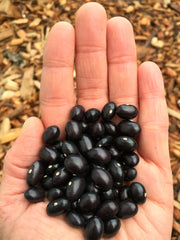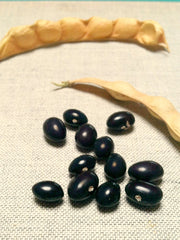Bean, Pole Dry, 'Tolosa'
*Ark of Taste Heirloom*
(P. vulgaris) As the title of an article in The Atlantic about the Basque black bean proclaimed a few years ago, Alubia di Tolosa is indeed “The Most Famous Bean in Spain”. Complete with its own “Brotherhood of the Bean”, a harvest festival in Tolosa, a Slow Food Presidium, and denominación de origin protection it is considered a pretty big deal in its homeland and is quickly gaining a wider audience. A vigorous climber, Alubia pushes the limits of our farm trellis system, growing easily to the tops of the 8’ poles and often continuing another 8’ horizontally along the top wire. Vines hang thick with pods of the plump, glossy black bean. Maturity is on the late side for the coolest pockets of the PNW but we have had no problems in our warming summers and know several growers who have reliable success in the Willamette Valley. The beautiful fine-skinned beans cook to a deep purple and the traditional preparation is one of simplicity: olive oil, bay leaf, salt. and nothing more. The publicity has been good for the growers in Spain; the beans fetch a good price and increasing demand has encouraged larger harvests each year. We first encountered these beauties at the 2006 Salone del Gusto during Terra Madre in Torino, Italy.
110 days. UO
Packet: 40 seeds
Availability: In stock
Growing Info
SOWING:
Direct seed after the last frost date when the soil has warmed.
Note: Beans prefer well-drained, warm soil.
PLANTING DEPTH:
1"
SPACING:
3-5" between plants with 12-24" between rows*
*Pole beans require 5+' between rows.
EMERGENCE:
5-10 days @ soil temp 65-90F
LIGHT:
Full sun to part shade
FERTILITY:
Light to Moderate. Beans can produce their own usable nitrogen from atmospheric nitrogen through a symbiotic relationship with bacteria that colonize specialized nodules in their roots. Too much soil fertility can cause excessive vegetative growth at the expense of pod set and maturity.
Beans prefer well-drained, warm soil with a pH between 6.0-7.0.
ADDITIONAL NOTES:
Beans prefer warm soils and may rot at lower temperatures. This is particularly true for white-seeded varieties. You love beans. Patience.
It can be quite beneficial to mix bean seeds with commercially available bacterial "inoculants" to encourage the beneficial symbiotic relationship in the growing plant's root nodules, especially if growing on ground that hasn't been planted with beans before. This can increase yields and improve plant health.
Avoid picking/weeding beans when the plants are wet. This will help prevent the spread of disease.
Provide a trellis for pole beans.
White-seeded varieties are more susceptible to rot when seeded in cool, wet, early-season conditions.
Sow Snap Beans every few weeks for continued harvests.
Harvest dry beans when the pods are brown and dry.




